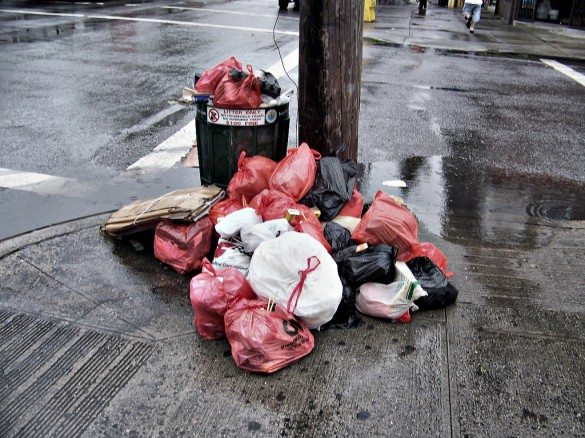Civic Group Seeks Plan To Curb Neighborhood Filth, Faces Pushback Over Agency Jurisdiction

The Madison-Marine-Homecrest Civic Association met on Thursday to create a roadmap for tackling the neighborhood’s trash problem, but faced pushback from the Department of Sanitation, which claimed some of their concerns were better addressed to other agencies.
Approximately 50 neighbors gathered at the Carmine Carro Community Center in Marine Park, located at Fillmore Avenue and Marine Parkway, to voice concerns to their local government representatives.
Bruno Iciano, the Community Affairs Liaison from the Department of Sanitation spoke first, opening up the floor to concerns from the group about ongoing garbage problems along major corridors, as well as underneath the Brighton Line subway overpasses. The group’s leadership expressed his hope that the department will work closely with the community to improve conditions.
“Our goal is to create a plan to attack all aspects of sanitation,” said Ed Jaworski, the civic association’s president. “It is our hope that grassroots might drive policy.”
Iciano spoke to the audience about several ways that local communities could get involved with neighborhood problems. He spoke highly of the “Adopt-A-Basket” program, the “Sponsor-A-Basket” program, and the Doe Fund. These first two projects would, respectively, allow property owners and individuals to take responsibility over local trash baskets and allow participants to sponsor “high-end” baskets that discourage residents from using them for household trash. The third program would provide local merchants the ability to hire individuals “going through tough times” at a low-cost to help clean up the streets.
The initiatives, though, fell short of satisfying neighbor’s questions, which focused on enforcement:
- “What do you do with repeat offenders?”
- “How can we tell if neighbors that get fined actually pay those fines?”
- “We need to do something about the subway overpasses by the B and Q train on Sheepshead bay. What can you do?”
Not many of these concerns were resolved. Rather, the conversation seemed to resemble a game of hot potato, a diffusion of responsibility by government agencies.
“We’re not responsible for cleaning sidewalks… The overpasses, those are the responsibility of the MTA… You’ll have to call 311,” Iciano said during his presentation.
The MTA, however, sees it differently. Responding to Sheepshead Bites’ questions about maintenance in February, the MTA has previously said that cleaning underpasses and removing hazards like snow and ice are the city’s responsibility, either through the Department of Transportation or the Department of Sanitation.
On preventing sidewalk litter baskets from overflowing, Iciano said they hope to work more closely with residents who live above the storefronts.
“We’re gonna have to do outreach on Avenue U,” he said.
City Councilman Chaim Deutsch told the crowd he would work to keep the pressure on the agencies.
“Keeping our communities clean is our main mission. We want people to stay and shop here. We don’t want them to go to other areas,” he said. “We need to educate small business owners. But that isn’t the only step. It’s a process, and I will be holding every city agency accountable.”
Jaworksi noted that he wished the MTA had sent a representative so that both, the MTA and DOS, could take ownership over the sanitation problems surrounding the local train stations.
“I wish someone would make the connection and take responsibility, say, ‘Let’s talk and get this done.’ How long can they keep passing the ball around?” said civic member Kathy Jaworski.




